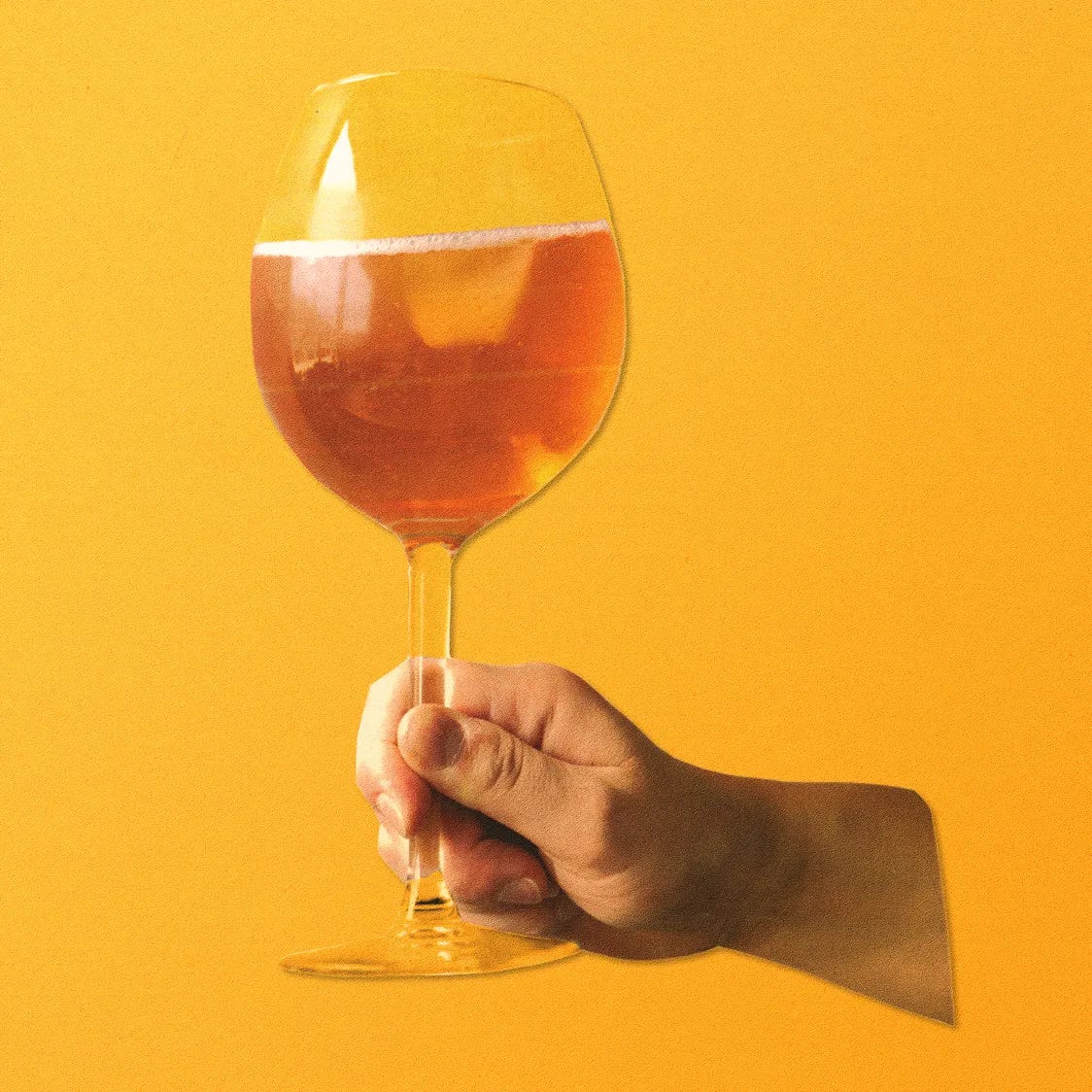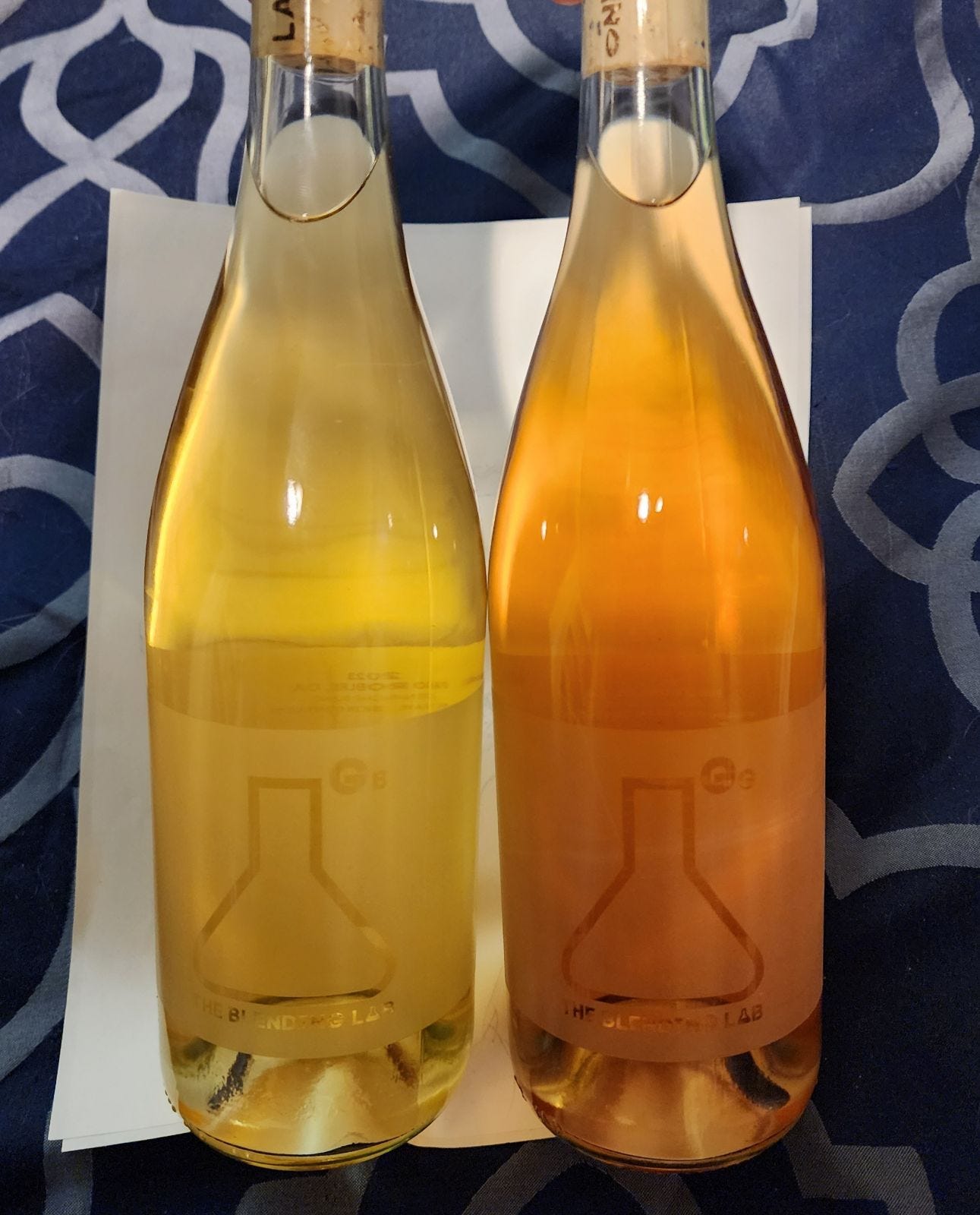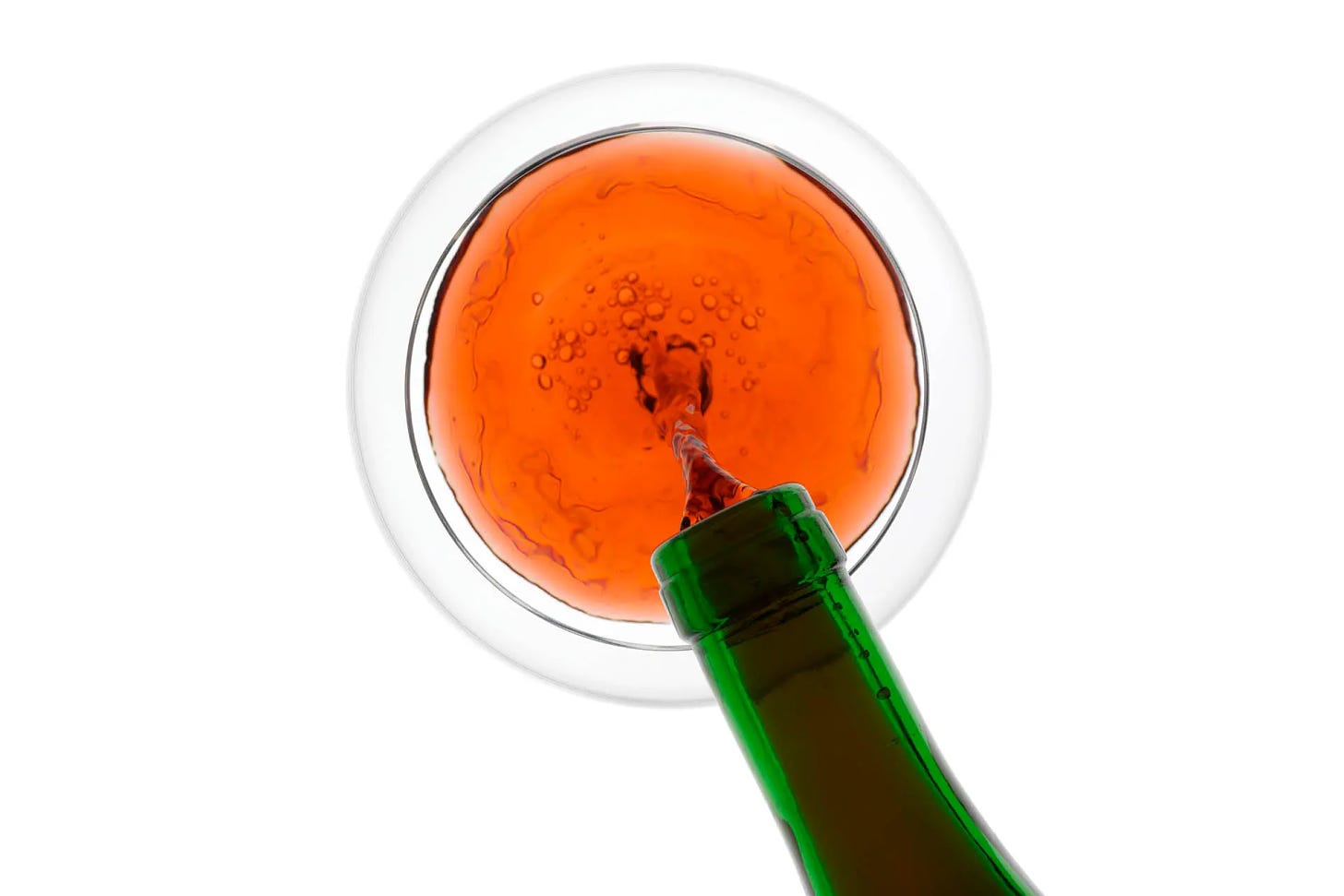I love orange wine. I've loved it since I sipped my very first. I thought it was wonderfully dimensional yet easy to enjoy, even though I had zero idea what precisely it was or how it was made.
These were the early days of my becoming an active wine appreciator, so I soon opened up oodles of articles and write-ups on this "Orange Wine". Because that's what wine writing is for, right? Having information available to consumers who care to look for it?
But that's where my frustration began, and continues to this day.
We need to talk about Orange Wine.
We need to talk about how we need to stop "talking about it".
Bear with me.
Orange Wine is Not New (and Therefore Not a Fad)
It's the oldest style of winemaking that we know of.1 We have to stop calling it a "new style" or nattering on about it's "rising popularity" like its some fad. Certainly, it's popularity has been on the rise and some day this ascension will peak and then roller coaster up and down just like all popularity. But if we want to talk about the "rise" of Orange Wine, we need to be laser focused on the fact that we were such absolute a-holes that we - as a global group - outright forgot it existed for half a century because leading winemakers weren't into it for essentially a generation and a half.
In that historically blink-and-you'd-miss-it amount of time, everyone was pressured into halting orange wine production.2 So much so, that the keepers of wine knowledge straight-up dropped it from every curriculum and knowledge base.
When the grandchildren of those who last utilized orange wine methods came of age, they recalled how their grandparents used to make wine, and revitalized the method while there were still people alive who remembered growing up with it. You'd think - wine people being self-proclaimed lovers of culture and history and tradition - that these grandkids would be [bleep]ing knighted for bringing back a style we'd sloppily allowed to be lost to time.
You'd think.
Orange Wine is Not Controversial, It's Fundamental

Shockingly (or maybe not-so-shockingly), the wine world didn't so much as say "oh, neat, thanks" for rescuing a nearly lost style of winemaking from long-term oblivion. Instead, they fought it tooth and nail.
The first major winemakers to release Orange Wine to their members, had half the bottles returned thanks to poor press and reviews. Sommeliers used the wines as examples of problematic examples. The industry said these winemakers had lost their minds. They trashed the flavor profile of these wines, denigrated their quality and even their reason for existence. These were not wines that were part of the "natural" wine movement, mind you. These were award-winning winemakers that were celebrated by all. And yet the moment they released wine in a traditional style of their home countries, it was soundly rejected. Out of hand.
Thankfully, the natural wine movement embraced the style. It admittedly worked well with their winemaking philosophies (orange wine still tends to be your best bet when it comes to the "natural" designation, in terms of pleasant flavors vs. challenging/obviously flawed ones.) Say what you will about the natural wine movement outside of this, we do have them to thank for keeping orange wine alive while the traditional wine industry wrung their hands and bad-mouthed it for literal decades.
But orange wine is not natural wine. Orange wine is not controversial at all. In fact, it's fundamental: it's just skin contact wine.
All wine classifications revolve around this one simple question: To Skin Contact or Not To Skin Contact. That's it. There isn't anything else to it.
White wine, red wine, rose wine, and now orange wine. They're each named after their most common color association, and are colored as such due to skin contact, how much, or the lack of it.
That's literally all it's about. How no one considered soaking the juice of non-red grapes on their skins for over half a century boggles my mind. It's plainly one of the 2 fundamental options that any winemaker should consider for any wine, regardless of skin color. (Grape racists, ammirite? "Gracists"?)
"Orange Wine" Is the Most Sensible Name For It
Argument 1: But...orange wine isn't always orange!
Counter: Neither are red wines always red. (They run from cherry red to purple-black.) Neither are all whites white. (They run from off-white to pineapple yellow.) Neither are all roses pink or rosy-colored.
All the color classifications in wine contain a range, a spectrum. There's no reason orange wine shouldn't as well. If it's not an issue with the other classification names, then it's not an issue with this one.
Argument 2: But If We Call it "Orange Wine" People Will Think It's Made From Oranges!
Counter: I hate to break it to every wine nerd everywhere, but the average consumer has zero idea how wine is made. Like, literally zero.
The winery I currently work at released two skin contact wines recently, a Grenache Blanc and a Grenache Gris:
Both wines spent 21 days on their skins, but you'll note from the above picture, the Grenache Blanc skins didn't change the color of the final wine to orange, it just made it a slightly deeper yellow. The Grenache Gris on the other hand, turned to a red-tea like orange.
When I present these wines to consumers, I call the Grenache Blanc a "white" and the Grenache Gris an "orange" and both "skin contact".
2 out of 3 people I say this to think "skin contact" means the winery stomped the grapes with their bare feet! I’m not kidding!
(And my personal favorite reaction, one lady shouted out "ANIMAL skins?!?!" That one took me by surprise and I stared at her in silence for far too long a spell. Not my proudest moment. Or hers.)
The point being: the term "skin contact" isn't going to clear anything up for most consumers. If a wine professional is there to talk to them, it doesn't matter which term we use, because we can enlighten them either way. And if they're just browsing a shelf on their own steam, neither term is going to mean to them what they mean to us.
And at least "orange" is a color, like the other wine style classification names. "Skin contact white" is a strange way to approach a different color classification of wine, when we do not mention the skin contact or lack thereof for any other within the system. We don't call reds "skin contact reds". We don't call a sparkling blanc de noirs "sans contact avec la peau de noirs". For [bleep]ing good reason.
We should stick with this approach/logic when considering orange wines.
Argument 3: "Amber Wine" is the better color name.
Counter: 100%, I agree. (Wait, I thought this was a counter? It is. I was gonna follow-up by saying) BUT…guess what? Too little, too late.
It’s unfortunate that we decided to name a color the same name as a fruit (“orange”), and that we then also make fruit-based wines where the names are just “[name of fruit] wine” - blackberry wine, blueberry wine, cherry wine, etc. It makes too much sense, then, to assume something called “Orange Wine” might be made from oranges.
BUT (there it is again)...that ship has sailed. “Orange Wine” is the known brand. Consumers don't seem to have a problem with it. If the wine world wanted to have a say in this, they needed to have gotten on board and not fought the mere blipity existence of the thing for 20+ years to begin with. You get what others market, if you choose not to be a part of it. And you don't get to come in all authoritative after the fact, pretending you were there the whole time, and not shutting down the original attempts of established, award-winning winemakers who tried to release them as whites in the first place. È la vita.
tl;dr - So What’s Your POINT, Dude?
Nobody explains what red wine, white wine, or rose wine is every single time they talk about one. Even though most people on the planet Earth have no idea how any of them are made.
There are now oodles of articles that come up in any online search that break down what orange wine is for the curious. We don't need more.
Therefore: let's stop treating orange wine like some brand new or controversial or wild style or whatever. It's a proper wine. Like all the other kinds of wine. It name and methodology fits precisely within the way we name and make all the others. The end.
The wine industry has had 35 years to get (back) on board. If anyone there doesn't know wtf orange wine is by now, your writing is falling on blind eyes and deaf ears in any event. And they can frankly cry me a [bleep]ing river for depriving me of delicious orange wine for so long.
If you don't explain what red wine, white wine, or rose wine is every time you talk about one, then don't do it for orange wine.
Let's stop "talking about" orange wine. And just talk about them instead.
Peace.
It's not quite as old as dirt, dirt had to come before any vine or grape, but otherwise orange wine is pretty up there in the seniority-of-existence.
(DEEP BREATH) Post World Wars, the style fell out of fashion, which, hey, happens. Things come and go in terms of public and professional preference. But the way in which orange wine was wiped clean from the historical record you'd think it had been Hitler's proclaimed favorite wine style or something.
Now some of this did turn out to be Russia's fault, thank goodness, an easy target to shake our fists at. The Soviet Union came to occupy the countries of Georgia, Slovenia, Hungary, etc. The countries where orange wine was still a tradition. Their new overlords prioritized quantity and mass production and so the slower skin-contact method was abandoned in favor of the swiftly made "clean" white wines. And this remained the reality until the 1990's, when Georgians started to reclaim their heritage, while there was still a generation who remembered what their parents and grandparents used to make.
But what about the rest of the world?
Turns out refrigeration - introduced in the late 1800s - brought about the rising fad/popularity of what we call "white wine" today, the "clean" no-skin-contact version of white, that tasted extra crisp and refined when properly chilled. And as I mentioned before: hey, it happens, things come and go in terms of fad popularity.
But the sin of the global wine industry was their navel-gazing: so blinkered was their attention on the wines coming out of France and Germany at that exact point in history, that the world outside of Soviet occupied territories forgot skin contact whites had ever existed. This in and of itself would be sad but not completely damning EXCEPT when orange wine was reintroduced in the 1990s - by expert, award-winning winemakers mind you - OH how the wine world fought it, denigrated it, hated it.
These were the so-called keepers of wine knowledge, of wine history, of tradition, and they had collectively forgotten an entire style of winemaking, the oldest and *most* traditional as it turned out. And probably embarrassed as all f*** that they had, they spent decades trying to proclaim orange wine new-fangled and just a fad and that no one could actually LIKE the stuff.
Fuckers.









Nice read
Good points, very well made! Thank you.
Since you know a lot about orange wine, maybe you can help me with a recommendation... I like the idea of orange wine in theory (because I like plenty of skin contact reds so why not whites?). That said, there's very few I actually like in practice, and I think that's because I'm really not into what I call the "cider effect" of natural wines. And where I'm from (Amsterdam), the orange wines available are still predominantly natural. Can you recommend any orange wines that are not made in a natural style? Not that I want to drink straight chemicals but you know what I mean! I'm looking for an orange wine without the funk, I guess.